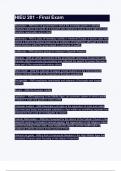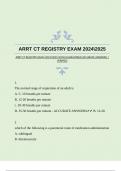Exam (elaborations)
HIEU 201 - Final Exam Questions and Correct Answers (elaborations) with 100% Accurate , Verified , Latest fully Updated , 2024/2025 ,Already Passed , Graded A+, Complete solutions guarantee distinctions Rationales
- Course
- Institution
HIEU 201 - Final Exam Questions and Correct Answers (elaborations) with 100% Accurate , Verified , Latest fully Updated , 2024/2025 ,Already Passed , Graded A+, Complete solutions guarantee distinctions Rationales
[Show more]




